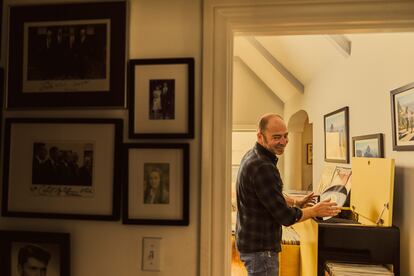Jimmy Carter’s nephew, to the rescue of the White House’s vinyl collection
John Chuldenko talks to EL PAÍS about the record selection, which includes albums by Janis Joplin, Bob Dylan and Joni Mitchell

December 2010. Obama was working in the Oval Office to prevent the government shutdown, struggling against the biggest stumbling block of his first term, the Republican Party. The opposition was pressuring him to extend George W. Bush’s tax cuts. The demands forced the president to change his plans to spend Christmas in Hawaii, where his family awaited him. On the other side of the presidential residence, the music of Van Morrison filled a movie theater upholstered in red velvet. John Chuldenko had chosen the album Astral Weeks to break the three-decade silence of one of the most mysterious music collections in the world.
“It’s incredibly profound,” Chuldenko confesses. Along with a group of “music nerds,” the writer and music fan chose the 1968 classic to break the tension of a special moment. They were finally before the collection that they had followed for years, a Holy Grail for lovers of both vinyl and politics, two of Chuldenko’s passions. “I really felt a sense of completion. They were designed to be played in this room, and I don’t think anyone had ever done it,” he said.
Chuldenko is the grandson of ex-president Jimmy Carter, now, at 98 years old, in palliative care. His stepfather is Jack Carter, the eldest son of the man who governed the United States between 1977 and 1981. “Music was playing in the White House constantly. My grandfather told me this story that when he wasn’t working in the Oval Office, unless he was actively in a meeting, there was always music playing,” Chuldenko recounts at his home in Los Angeles. On the walls of his house hang photographs from the presidency and posters from the campaign of the former Georgia governor. Artists like Willie Nelson and The Allman Brothers Band backed Carter in one of the first examples of how rock could influence young voters.

The Rolling Stones were responsible for alerting Chuldenko to the White House records. His uncle Jeff, the third of Carter’s three sons, told him that one day, the music of Jagger and company was so loud that his mother and Joan Mondale, the vice president’s wife, intervened to lower the decibels of Their Satanic Majesties Request (1967), which had filtered into an important dinner. “I asked, well, where’d you get the records? He said, there were records there. … That opened up a can of worms and the deep dive that I ended up doing to try to uncover more about this mysterious record collection,” he says.
The collection was born from an industry’s desire to influence power. The Recording Industry Association, a lobbying group, knew that the White House had a library (started by a similar group, but of editors). In 1969, it proposed to the Richard Nixon administration to curate a special music selection. A commission of five experts — four white men and one white woman — met once a month in New York to propose the titles to include, which would be limited to 2000. “It was always intended to act as a window outside the White House,” Chuldeeneko says. That first edition included easy listening and big band music. It also had some gems: there was Elton John’s first album, then a composer who had just played at Los Angeles’s Troubadour; Janis Joplin’s Pearl; two compilations of Bob Dylan’s hits; Joni Mitchell’s Clouds; Sly & the Family Stone’s Stand!, and a Frank Zappa album. The jazz selection featured three John Coltrane titles, five by Miles Davis, six by Duke Ellington and only one by Ray Charles.
The collection was presented in 1973 by Pat Nixon, the First Lady. It was divided into six categories: pop, classic, jazz, folk, country and gospel. The albums were stored in folders with the presidential seal, each genre with its own color. An additional section of recordings and spoken word material included Vladimir Nabokov reading Lolita and the Hungarian Revolution narrated by its leader Bela Kiraly.
The selection was meant to imitate the library, which was updated every four years. When the records’ moment came, though, the Watergate scandal had expelled the Nixons from the White House, and, with them, the project. The Carters took up the ice again in 1979. “They got carte blanche to really push the limits in the second edition,” Chuldenko says. The selection committee grew and became more inclusive, including a younger woman and Ed Bland, a black producer at Vanguard Records, in charge of blues. Bob Blumenthal, who was in charge of pop music, insisted on also including Latin music.
The updated collection was presented in the early days of January, 1981. Carter had lost his re-election attempt to Ronald Reagan. “They pulled the solar panels off the White House and got rid of the record library. It was boxed up and put in storage,” Chuldenko says.
“There are big things happening,” he smiles. This year marks half a century since the first collection was presented. “It’s a big occasion. My fingers are crossed that we can get the right people to say yes.” It is no secret that Joe Biden has a high opinion of Jimmy Carter. Chuldenko has proposed updating the collection, which was frozen in the early 1980s without seeing the emergence of rap or stars like Michael Jackson, Madonna and Prince. “It would be a dream,” says the man who snuck a record player into the White House in 2010 to pull notes out of records that had been hidden in obscurity.
Sign up for our weekly newsletter to get more English-language news coverage from EL PAÍS USA Edition
Tu suscripción se está usando en otro dispositivo
¿Quieres añadir otro usuario a tu suscripción?
Si continúas leyendo en este dispositivo, no se podrá leer en el otro.
FlechaTu suscripción se está usando en otro dispositivo y solo puedes acceder a EL PAÍS desde un dispositivo a la vez.
Si quieres compartir tu cuenta, cambia tu suscripción a la modalidad Premium, así podrás añadir otro usuario. Cada uno accederá con su propia cuenta de email, lo que os permitirá personalizar vuestra experiencia en EL PAÍS.
¿Tienes una suscripción de empresa? Accede aquí para contratar más cuentas.
En el caso de no saber quién está usando tu cuenta, te recomendamos cambiar tu contraseña aquí.
Si decides continuar compartiendo tu cuenta, este mensaje se mostrará en tu dispositivo y en el de la otra persona que está usando tu cuenta de forma indefinida, afectando a tu experiencia de lectura. Puedes consultar aquí los términos y condiciones de la suscripción digital.









































